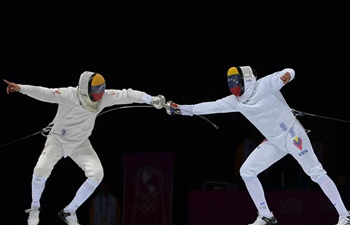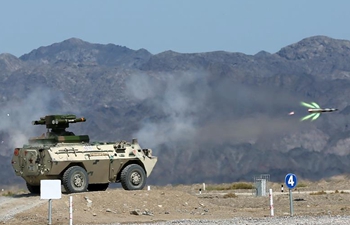
Photo taken on Aug. 5, 2019 shows the "Good Defeats Evil" sculpture at the United Nations headquarters in New York. The sculpture was a gift presented by the Soviet Union in 1990 on the occasion of the 45th anniversary of the United Nations. As a vivid symbol of disarmament, the piece intended to tell the world that after a long cold war, the two major powers reached a consensus and determined to let peace prevail over war. (Xinhua/Li Muzi)
by Xinhua writers Ma Jianguo and Lin Yuan
UNITED NATIONS, Aug. 5 (Xinhua) -- In the courtyard of the UN headquarters stands a large and imposing sculpture titled "Good Defeats Evil," a gift presented by the Soviet Union in 1990 on the occasion of the 45th anniversary of the United Nations.
The sculpture depicts an allegorical St. George slaying a double-headed dragon, which was made from fragments of actual Soviet and U.S. missiles destroyed under the terms of the Intermediate-Range Nuclear Forces (INF) Treaty of 1987.
As a vivid symbol of disarmament, the piece intended to tell the world that after a long cold war, the two major powers reached a consensus and determined to let peace prevail over war.
Unfortunately, on Aug. 2, 2019, less than 29 years after the statue was sent to the UN headquarters, the United States formally withdrew from the INF Treaty, and the statue seemed to have turned powerless and ironic.
The agreement to curb intermediate-range missiles was scrapped at the behest of a wayward U.S. administration, which threatens to drag the two major military powers back into a Cold-War-style arms race.
UN Secretary-General Antonio Guterres issued a statement expressing his "deep regret" at the ending of the INF treaty, and warned that "the world will lose an invaluable brake on nuclear war."
Rather than stepping on the brake, Washington seems to have shifted to the accelerator. Hours after the expiration of the treaty, the Pentagon announced it would fully develop land-based conventional intermediate-range missiles previously restricted by the treaty.
Moreover, reports say the U.S. military is to test new mobile-launched cruise missiles in the coming weeks and medium-range ballistic missiles in November, allegedly to confront Russia in Europe.
China deeply regrets and strongly opposes the U.S. withdrawal from the INF Treaty, Chinese Foreign Ministry spokesperson Hua Chunying said. "Withdrawing from the INF is another negative move by the U.S., ignoring its own international commitment and resorting to unilateralism."
If the United States resumes its research and deployment of the intermediate-range missiles after its withdrawal from the treaty, it will severely affect global strategic balance and stability, aggravate tensions and distrust, disrupt international nuclear disarmament and multilateral arms control processes, and threaten peace and security in the region, she added.
Many cannot help but worry that the world might see an "evil defeats good," an inverse of the message conveyed by the sculpture of "Good Defeats Evil."
The sculpture, having served as a symbol of peace at the UN for nearly three decades, should not be turned into a witness of unbound monsters of nuclear missiles.















